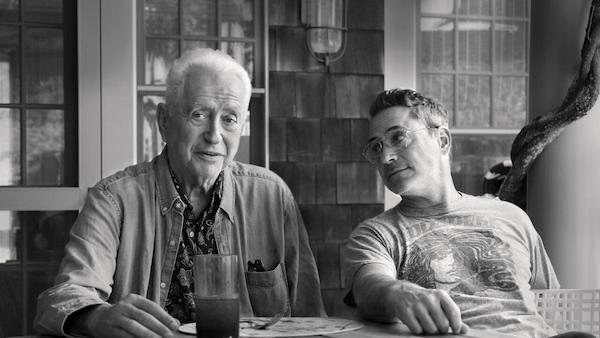Film Review: “Sr.” — Positive, Funny, and Insightful Senior Moments
By Ed Symkus
An unconventional documentary explores the career of unconventional filmmaker Robert Downey Sr.
Sr.is available on Netflix.

Robert Downey Sr. and Robert Downey Jr. a scene from Sr.
Part documentary, part art film, part home movie, Sr., the newest entry in the canon of director Chris Smith (Jim & Andy: The Great Beyond, The Yes Men, American Movie), is also a sweet and intimate story about family – focusing on a father-son relationship – and about the career of the singular writer-director Robert Downey Sr.
Or maybe it’s something else. Perhaps the best way to explain this unconventional piece of cinema is that while you’re watching it, it becomes clear that it’s about the making of the film you’re watching. The subject’s son, Robert Downey Jr., wanted to make a film about his dad and their life together. Obviously, they would both be in the film, and Jr., along with his wife Susan Downey, served as producers. While Jr. has had a stellar career as an actor, and grew up in the milieu of his dad’s work, he’s not a director. So, director Chris Smith was brought onboard. But everyone involved in this project knew that even though Sr. hadn’t made a film in 20 years, he still had a director’s disposition.
Unlike any documentary I’d seen before, Sr. features scenes of Robert Downey Sr. making suggestions for how this film about him should look and what should go in it during the editing process. There are also scenes of Robert Downey Jr. chatting with his dad about the progress of the film, as well as talking directly to the camera about how the project was going. On top of all that, Chris Smith actually directed it.
Though Downey, who succumbed to Parkinson’s Disease in 2021, never had anything approaching a hit, he certainly made his mark – mostly on the independent scene – with a smattering of shorts and TV episodes, 14 features, and one documentary between 1961 and 2005. Nor has he earned any awards for his work. But his breakthrough film, Putney Swope (1969), a dark, absurdist, bitingly satirical comedy about an unambiguously racist New York ad agency that inadvertently names a Black revolutionary as its chairman, was placed on the National Film Register at the Library of Congress in 2016.
The portrait painted here of Downey Sr. comes from his own memories, from those of his wife Rosemary, his son, his grandson Exton, a couple of longtime pals – Norman Lear and Alan Arkin – and director Paul Thomas Anderson, who considers Downey a major influence, and gave him a couple of acting roles: the record studio manager in Boogie Nights and the TV director in Magnolia.
Obviously proud of his contributions to the art form, Sr. is particular about which scenes from his films would work best in a film about him, then waxes about them as clips are shown. Of Chafed Elbows (1966), about a guy who marries his mother, then goes on welfare, he notes – and is still surprised by the fact – that it was reviewed by the New York Times, and “it was the start.” Switching to The Sweet Smell of Sex (1965), in which a chimp is “involved” in a bedroom scene, he says, “We didn’t know what we were doing, but suddenly the films started getting better … or weirder.”
With the art house successes of Putney Swope and its follow-ups Pound (1970) – people play dogs in a pound who know they’re going to be killed – and Greaser’s Palace (1972) – he describes it as “Father, Son, and Holy Ghost, popped into a Western” – he eventually got the call from Hollywood to direct Up the Academy. Unfortunately, the studios wouldn’t tolerate the freewheeling creative climate he was used to. Also, by that time he had already fallen under the spell of the drug culture. “I was an addict,” he admits. “Mainly cocaine and marijuana.”
But Smith’s film doesn’t dwell on the downs or even the ups of Sr.’s life. It hops around from chapter to chapter, sometimes focusing on Jr.’s ruthlessly reported drug problems, other times having Sr. casually discuss how he was trying to be positive about his dealing with Parkinson’s.
The main point of documentary is to show the love and respect between father and son, how they made each other laugh, and how the world of filmmaking deepened the strong bond between them. It’s a thoughtful, insightful, and very personal film.
Ed Symkus is a Boston native and Emerson College graduate. He went to Woodstock, is a fan of Harry Crews, Sax Rohmer, and John Wyndham, and has visited the Outer Hebrides, the Lofoten Islands, Anglesey, Mykonos, the Azores, Catalina, Kangaroo Island, and the Isle of Capri with his wife Lisa.
Tagged: Chris Smith, Ed Symkus, Robert Downey Jr., Robert Downey Sr.
